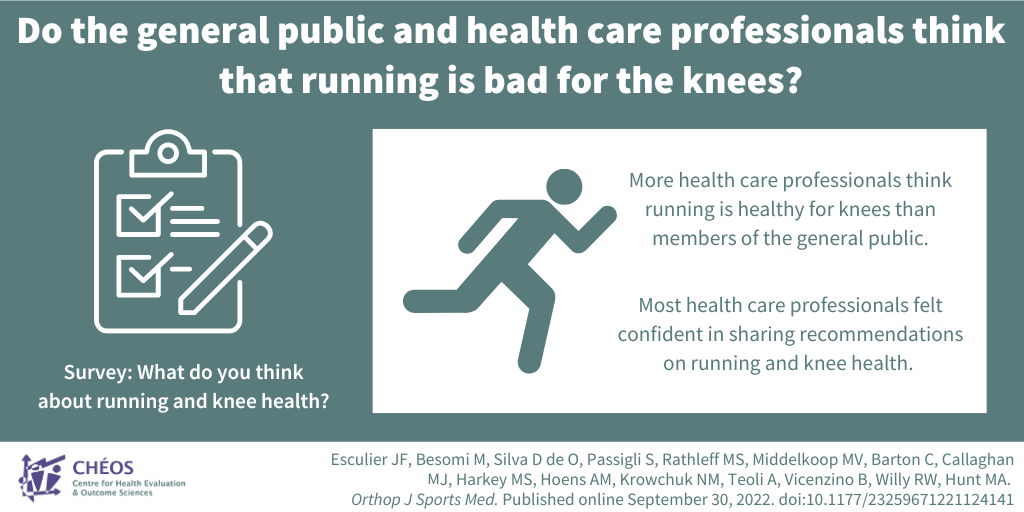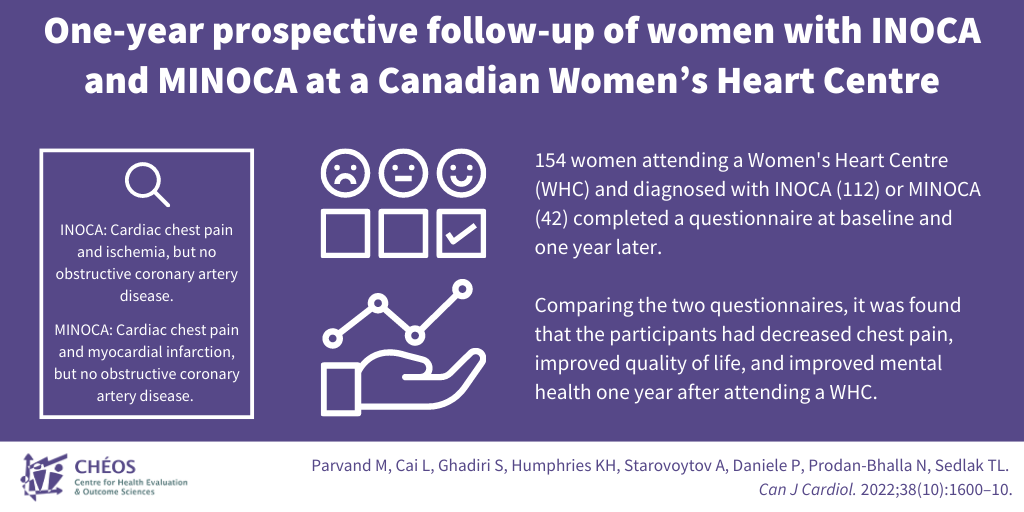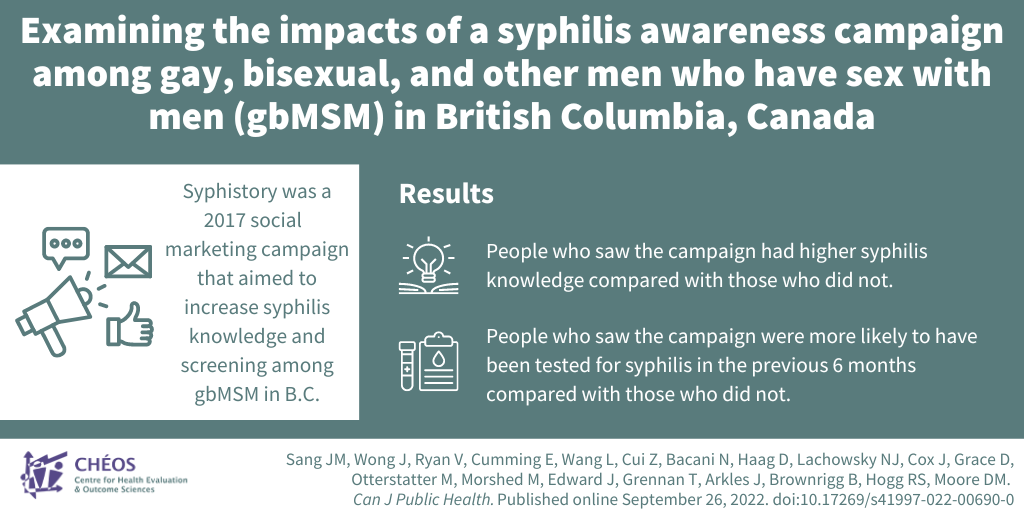The Evidence Speaks Series is a recurring feature highlighting the latest in CHÉOS research. This series features summaries of select publications and is designed to keep media and the research community up to date with CHÉOS’ current research results in the health outcomes field.
To ensure this research is quick and easy to share, we are now providing social cards that you are free to save and use as you see fit.
The general public perceive running as harder on the knees than health care professionals
Esculier JF, Besomi M, Silva D de O, Passigli S, Rathleff MS, Middelkoop MV, Barton C, Callaghan MJ, Harkey MS, Hoens AM, Krowchuk NM, Teoli A, Vicenzino B, Willy RW, Hunt MA. Do the General Public and Health Care Professionals Think That Running Is Bad for the Knees? A Cross-sectional International Multilanguage Online Survey. Orthop J Sports Med. Published online September 30, 2022.
CHÉOS Research Associate and Physical Therapy Knowledge Broker Alison Hoens and colleagues investigated how the general public and health care professionals (HCPs) perceive running and knee health, and sought to understand if HCPs are comfortable providing recommendations on the topic. A total of 4,521 people (2,514 general public, 2007 HCPs) completed an online survey on running and knee health, with additional questions for HCPs on recommendations they provide. The research group learned that a greater proportion of HCPs thought regularly running was healthy for knees compared with the general public. The general public were more likely to associate running frequently, on hard surfaces, and long distances with developing knee issues like osteoarthritis or causing more pain and complications for people already living with knee osteoarthritis. The survey also indicated that most HCPs were confident in providing recommendations on running and knee health, including for people with knee osteoarthritis.

—
Attending multidisciplinary Women’s Heart Centres could improve outcomes for women with INOCA and MINOCA
Parvand M, Cai L, Ghadiri S, Humphries KH, Starovoytov A, Daniele P, Prodan-Bhalla N, Sedlak TL. One-Year Prospective Follow-up of Women With INOCA and MINOCA at a Canadian Women’s Heart Centre. Can J Cardiol. 2022;38(10):1600–10.
A lot of women who have cardiac chest pain and ischemia or myocardial infarction have no obstructive coronary artery disease (known as INOCA or MINOCA, respectively). Previous studies indicate that these women often experience worse quality of life and a higher likelihood of cardiovascular issues. CHÉOS Program Head of Cardiovascular Health Dr. Karin Humphries, Scientist Dr. Tara Sedlak, and team worked to understand if attending a multidisciplinary Women’s Heart Centre (WHC) impacted patients’ quality of life and cardiovascular health one year after admission and diagnosis with INOCA or MINOCA. A total of 154 patients, 112 with INOCA and 42 with MINOCA, completed questionnaires at baseline and at their one-year follow-up appointment. Comparing the two questionnaires revealed that participants had less chest pain, improved quality of life, and improved mental health one year after attending the WHC. These results suggest that attending a WHC may improve outcomes and quality of life for women with INOCA or MINOCA.

—
Social marketing campaigns could help increase knowledge and testing of sexually transmitted infections
Sang JM, Wong J, Ryan V, Cumming E, Wang L, Cui Z, Bacani N, Haag D, Lachowsky NJ, Cox J, Grace D, Otterstatter M, Morshed M, Edward J, Grennan T, Arkles J, Brownrigg B, Hogg RS, Moore DM. Examining the impacts of a syphilis awareness campaign among gay, bisexual, and other men who have sex with men (gbMSM) in British Columbia, Canada. Can J Public Health. Published online September 26, 2022.
The rate of syphilis infection is high in B.C., and the majority of cases are among gay, bisexual, and other men who have sex with men (gbMSM). CHÉOS Scientist Dr. Troy Grennan and colleagues analyzed how effective a 2017 social marketing campaign, called Syphistory, was at increasing syphilis knowledge and screening among this population. To determine if Syphistory improved syphilis knowledge, attendees to STBBI clinics were invited to answer pre- and post-campaign surveys consisting of 12 true/false questions about syphilis. The results suggested that participants who saw the campaign were more knowledgeable about syphilis than those who did not. To determine if the campaign impacted screening, the researchers analyzed data from the existing Engage Study, a study of gbMSM in Canada. They found that, while only 12.7 per cent of participants reported seeing the campaign, those who did were more likely to have been tested for syphilis in the prior six months. Overall, this study suggests that social marketing campaigns may be an effective tool to improve STBBI knowledge and screening; however, consideration needs to be put into how to increase campaign visibility. 



